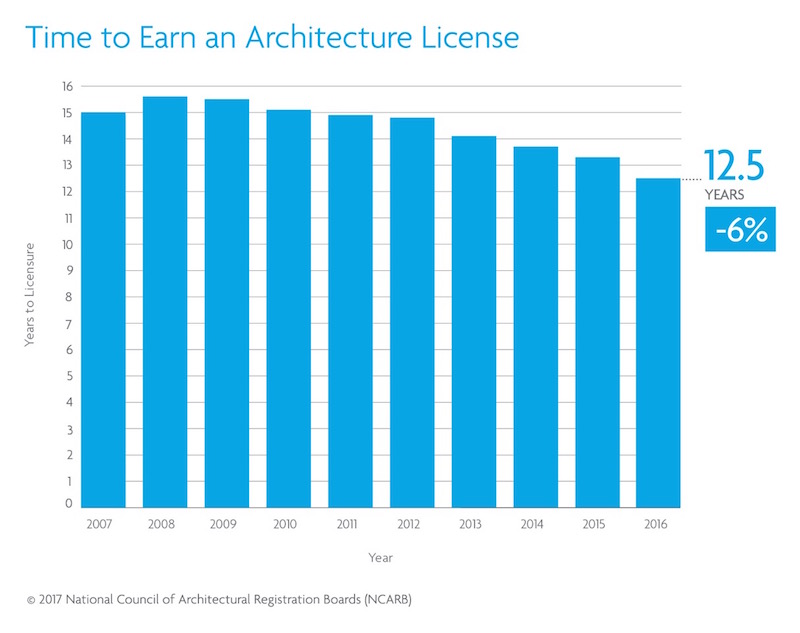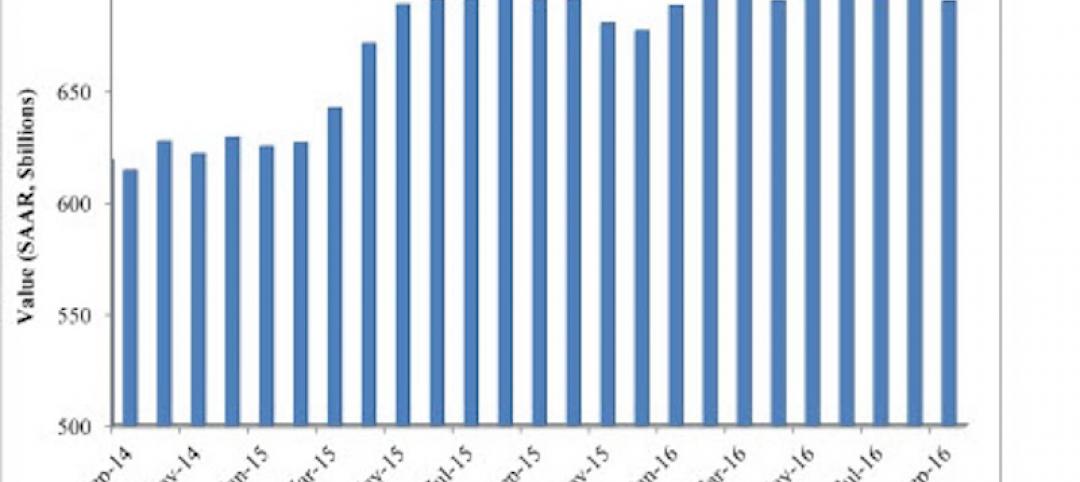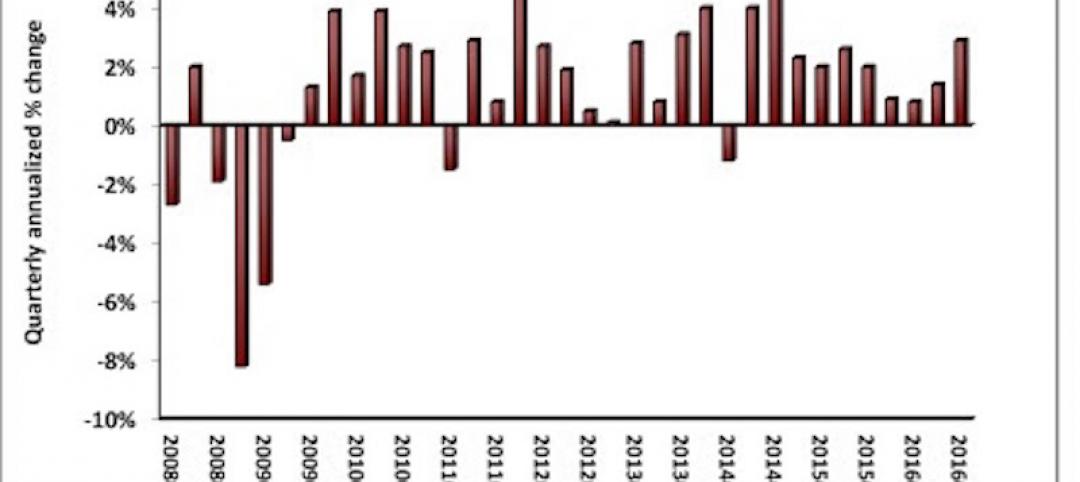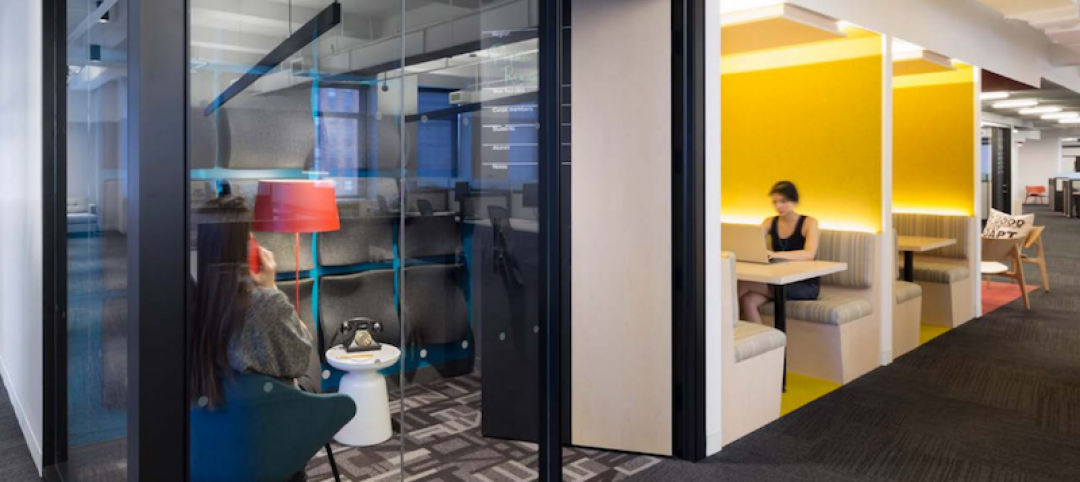The latest architect licensing data indicates that the time to become an architect has decreased to an average of 12.5 years—from the time a student enrolls in school to the moment they receive a license. This is the eighth year in a row that the timeline to licensure has shortened, according to data from the 2017 edition of NCARB by the Numbers. This trend is driven by candidates completing the experience and examination programs concurrently and more quickly.
Released annually by the National Council of Architectural Registration Boards (NCARB), NCARB by the Numbers provides exclusive insight into the number of U.S. architects, the pool of candidates working toward licensure, and diversity in the profession.
Over the past decade, NCARB has worked with licensing boards to streamline, update, and align two key pillars on the path to licensure: the Architectural Experience Program™ (AXP™) and Architect Registration Examination® (ARE®). These efficiencies have led to a reduction in completion times. Plus, newly licensed architects are increasingly overlapping these two programs. As a result, the time it takes to earn a license has gradually improved, with architects earning a license 9.6 months sooner than in 2015.
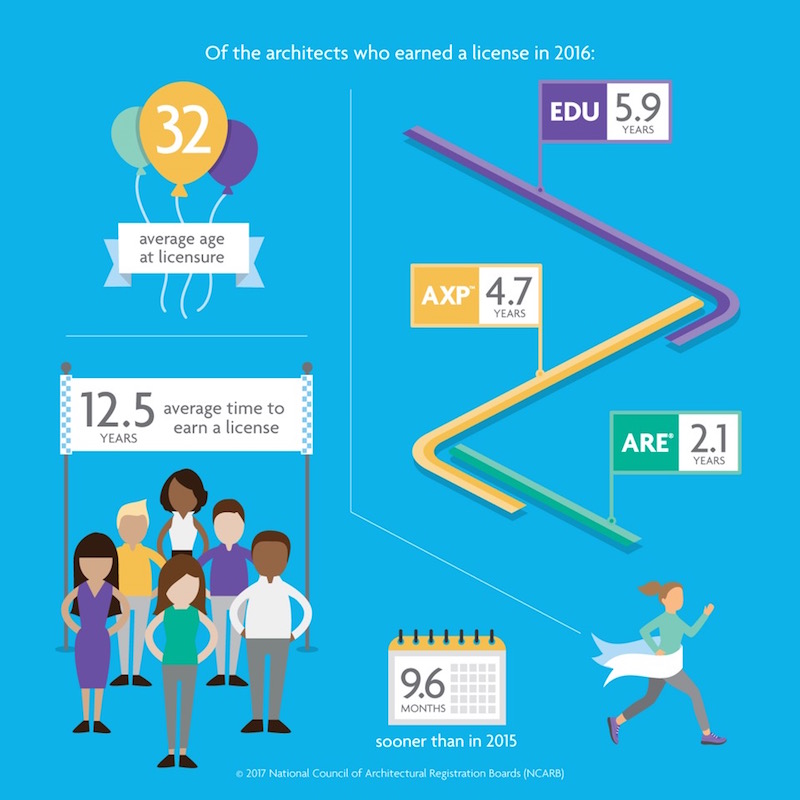
A closer look reveals that architects who earned an initial license in 2016 completed the AXP and ARE in just under six years. For comparison, architects licensed in 2015 took just under seven years to complete the two programs.
“By updating our programs to reflect the realities of modern practice, candidates can now pursue licensure in a way that ts their lifestyle,” said NCARB President Kristine Harding, NCARB, AIA. “With guidance from our licensing boards, NCARB has been able to open doors to a new pool of candidates while maintaining the rigor needed to protect the public’s safety.”
NCARB’s data also reveals that new architects are slightly younger. In 2016, the average age of a newly licensed architect was 32, an eight-month drop from the previous year. This marks the eighth year in a row that this benchmark has decreased, with architects earning a license 2.8 years sooner than a decade ago.
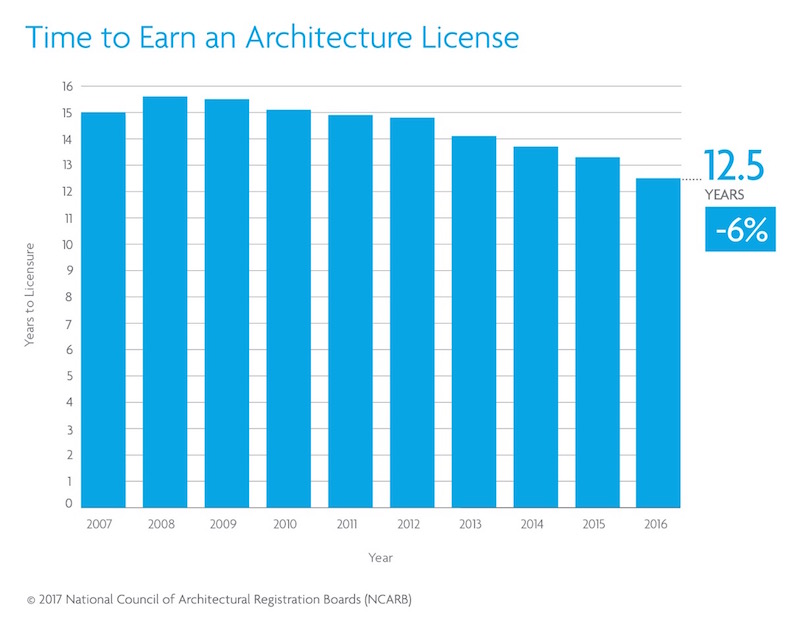
The full 2017 edition of NCARB by the Numbers will be available in July. To learn more about NCARB’s data, visit www.ncarb.org.
Related Stories
Industry Research | Nov 4, 2016
New survey exposes achievement gap between men and women designers
Female architects still feel disadvantaged when it comes to career advancement.
Market Data | Nov 2, 2016
Nonresidential construction spending down in September, but August data upwardly revised
The government revised the August nonresidential construction spending estimate from $686.6 billion to $696.6 billion.
Industry Research | Nov 1, 2016
Perkins Eastman Research releases white paper on ‘Centers for Healthy Living’ and whole-person wellness
Among the spotlight projects used as case studies for this white paper are C.C. Young, Dallas, Texas; Clark-Lindsey Village, Urbana, Ill.; Moorings Park, Naples, Fla.; NewBridge on the Charles, Dedham, Mass.; Rockwood Retirement Living: The Summit, Spokane, Wash.; Saint John’s on the Lake, Milwaukee, Wis.; and Spring Lake Village, Santa Rosa, Calif.
Market Data | Oct 31, 2016
Nonresidential fixed investment expands again during solid third quarter
The acceleration in real GDP growth was driven by a combination of factors, including an upturn in exports, a smaller decrease in state and local government spending and an upturn in federal government spending, says ABC Chief Economist Anirban Basu.
Market Data | Oct 28, 2016
U.S. construction solid and stable in Q3 of 2016; Presidential election seen as influence on industry for 2017
Rider Levett Bucknall’s Third Quarter 2016 USA Construction Cost Report puts the complete spectrum of construction sectors and markets in perspective as it assesses the current state of the industry.
Industry Research | Oct 25, 2016
New HOK/CoreNet Global report explores impact of coworking on corporate real rstate
“Although coworking space makes up less than one percent of the world’s office space, it represents an important workforce trend and highlights the strong desire of today’s employees to have workplace choices, community and flexibility,” says Kay Sargent, Director of WorkPlace at HOK.
Market Data | Oct 24, 2016
New construction starts in 2017 to increase 5% to $713 billion
Dodge Outlook Report predicts moderate growth for most project types – single family housing, commercial and institutional building, and public works, while multifamily housing levels off and electric utilities/gas plants decline.
Industry Research | Oct 20, 2016
New book from HDR explores opportunities for how healthcare organizations can reinvent the patient experience
Delta offers a close look at specific activities and behaviors that can help healthcare providers and caregivers discover revolutionary concepts to help them embrace and thrive in the rapid change that surrounds them.
Designers | Oct 12, 2016
Perkins Eastman and EwingCole co-publish new white paper examining the benefits and challenges of design research
The survey’s findings, combined with input from the EDRA conference, informed the content produced for “Where Are We Now?”
Market Data | Oct 11, 2016
Building design revenue topped $28 billion in 2015
Growing profitability at architecture firms has led to reinvestment and expansion


